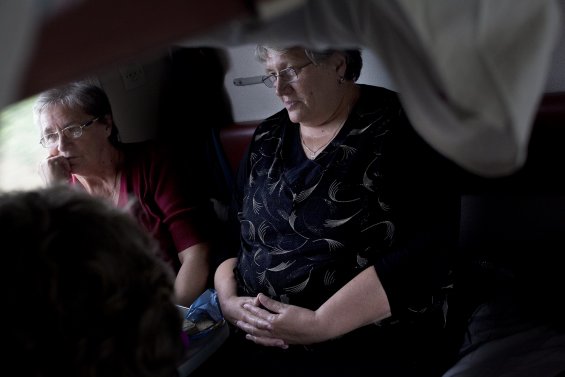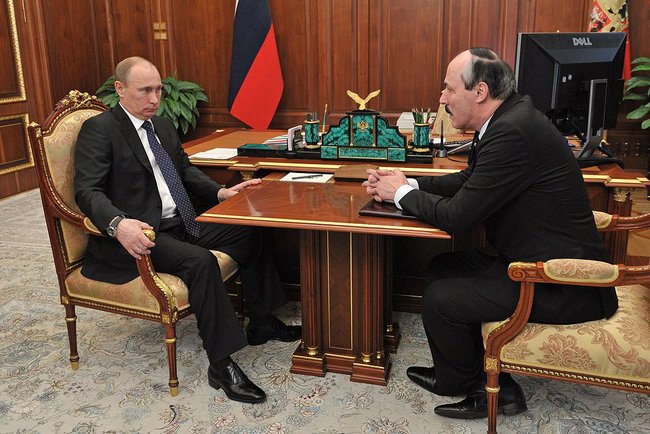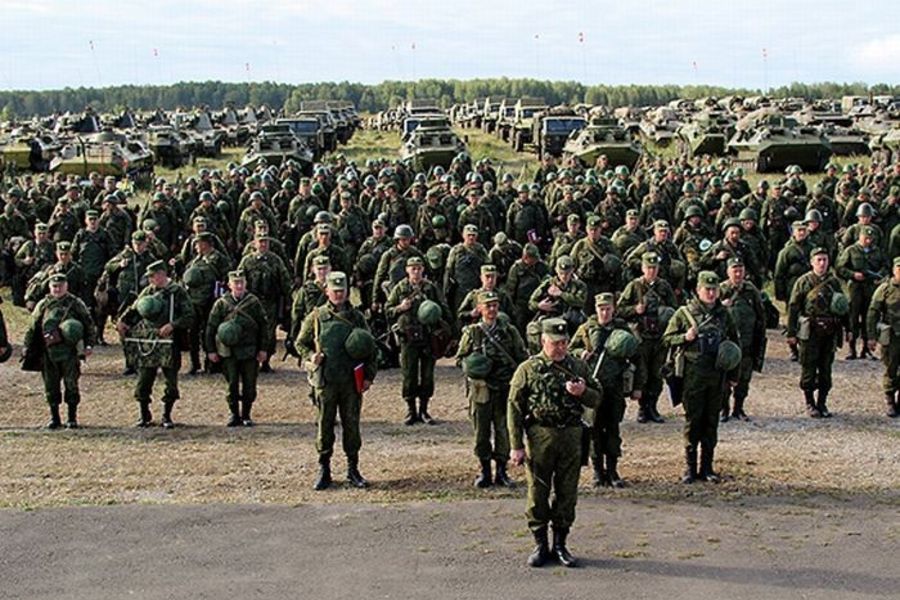Nikita Girin, Novaya Gazeta. 9/12/2014
Top picture: Tamara and Lida on a train. The regional authorities bought their tickets from Ufa. However, one of them was for an overhead seat none of the elderly women can reach. They slept in shifts on the lower one
We catch the elderly sister refugees Tamara and Lida on a train from Ufa. We are riding to Kamenskaya, 35 km from the Donetsk-Izvarino border points. In the window the Bashkir forest gives way to grim Saratov huts, fields of bent sunflowers, Rostov steppes... Closer to the destination echelons of military vehicles appear. To amuse themselves, the grandmothers write down the names of each station in a notebook: Liski, Rossosch, Mitrofanovka, Kantemirovka... Their native Novoannovka lies 40 km from the border towards Luhansk. Tamara dna Lida are going home.- They promised a lot: "We'll accommodate you, don't you worry". We got nothing in the end. They said they would keep us in the school for another month, until September 23, and after that we had to leave. The deputy head of the administration said: "I can't offer you anything...".
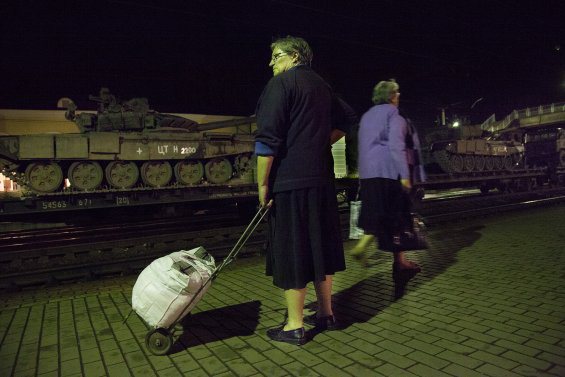
The pensioneers got to a temporary accommodation point near Ufa (Tashlykul village in the Buzdyak district) on a quota from a tent camp near Donetsk, Rostov region, Russia. They fled to there on August 14, having spent a month in the basement of a village school. At a checkpoint the rebels gave them six cans of spam and two cans of pineapples. "I think they give rations to them, so they shared" - Lida recalled during our first meeting. Back then the refugees were very happy with the Russian camp. "We eat meat three times a day, there's a place to shower and light everywhere. And there are places to make phone calls. And even a place to charge your phone on every lightpost. Everything is thought-out. Thanks to your Putin. We should wash his legs and drink the water" - that phrase blew up our comment section.
A burden
The sisters chose Bashkortostan as the closest region of those the authorities offered. Even then they worried they would be useless at the new place: "We will come, they will have to feed us. And we're too old to work. We're like a burden..." Lida is a vet by profession, Tamara is an accountant.
The point of temporary accommodation turned out to be a shutdown school. Two, three or six people stayed in a room depending on the size. There was a total of 50 peple. On August 23, the day of arrival, the refugees were forbidden to communicate with the locals: quarantined. The next day they were brought to a district hospital, where, despite it being Sunday, they were checked by doctors working overtime. The police, Lida recalls, "took fingerprints" right at the hospital. She didn't know why.
However, they were not allowed to walk outside the camp even after the checkup, the refugees tell. They were only allowed to go to the post office to pay cellphone bills, and that upon prior approval. "They are responsible for us" - the women explain the strict supervision to themselves. Generally the hospitality in Tashlykul was the same as in Donetsk.
"They fed us well, on a schedule, four times a day. We didn't carry our things, the emergency workers helped us. Everything was clean, they changed our sheets every week.
They young ones and families quickly got work and places to live. Only old ones remained neglected. Tamara and Lida got "temporary refuge" for a year. They asked how to get refugee status, but "no one explained that".
Finally, the refugees say, the deputy head of the Buzdyak district Grafit Shakirov confessed to them there was a problem with setting them up. We called him when we got off the train.
"We provided all families with multi-room apartments and work: on the collective farm, in cafes, at school. We provided all children with warm clothes and school uniform. Almost 90% of the refugees in out region (there's a total of 74) have been "set up". And the retirees... We help them where we can, but if we can't - what can I do?" - Grafit Shakirov told us via phone. However, the refugees wrote a letter of gratitude to the local authorities. "They treated us well. Maybe they got orders or maybe they really didn't know what to do with us".
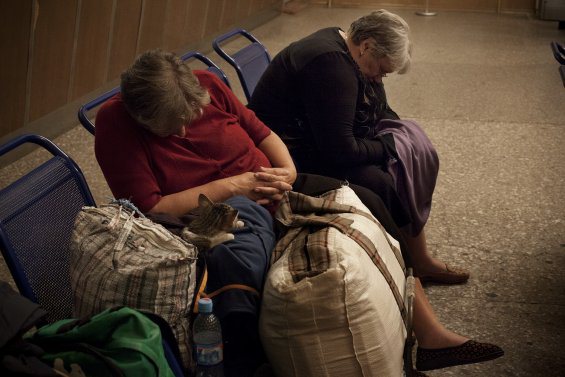
Last Friday, when the news of ceasefire hadn't yet come, the sisters asked the district's administration to buy them tickets to Kamenskaya. The women decided not to wait till September 23 to have time to fix their apartments if they'd been hit while the weather was still good. If they were allowed to stay for the promised 3 months, they would. But they still wouldn't apply for Russian citizenship. In their questionnaires for the Federal Migration Service they stated: "We'll go back as soon as the shooting stops completely". "We have our roots there" - Tamara explains curtly, and Lida recalls how she tried to get her father-in-law from Novoannovka to Luhansk. "He told me: "See that old apple tree in the yard? Try plant it at your place. If it takes root, I'll move as well".
"The road of death"
"So we are going back to Ukraine, home. We don't know whether our house got bombed, whether the windows got shattered. We only know that they showed the neighboring Novosvetlovka on TV and said the road was booby-trapped. That's out road, from Krasnodon to Luhansk, they called it "the road of death"... I don't know ho we'll get through. We are afraid. But what else could we do, stay homeless here?" - Lida asks. Tamara looks into the train window through here old glasses covered in a web of scratches, cringes when the hears the sound of an oncoming train and shudders when it roars past.
Tamara and Lida have apartments in adjacent staircases of an apartment blocks. The children (Tamara has two daughters, Lida has a son) live separately. Lida just "can't settle in" with her son. "We just have different personalities. I'll be honest, he likes a drink. And when he's drunk he's a total fool. Not just a fool, a beast," the woman sighs. Now his son has joined the rebels. She hasn't heard from him since August 14. Lida worries but says: "It's better that he dies than proves himself a coward".
The refugees get to the carriage doors with their bags almost an hour before the stop. Tamara keeps coming up to the door impatiently, leaning on the window, covering the lightbulb with her hand, peering into the Southern evening darkness for several seconds and then stepping back and shrugging to herself.
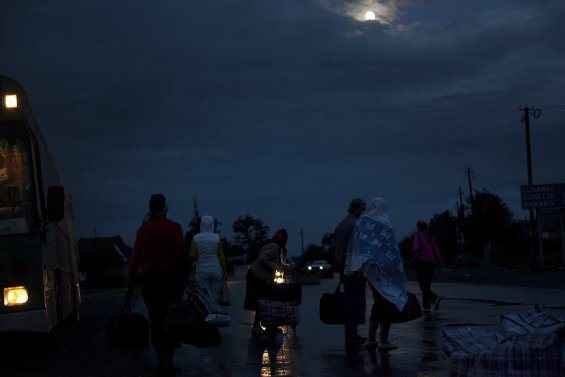
The first thing the sisters see upon getting off the train - another echelon of military vehicles and couple carriages with soldiers. Half an hour later it left for a Rostov. In another half an hour another took its place.
The railway station
The departure lounge with Stalin's era Neoclassicist decorations on the walls and ceilings (we spent the night there to go to the border checkpoint on the first morning bus) is almost empty: a young couple, a middle-aged man and an old woman. Turns out these are also refugees returning home. In an hour there's already twenty people sitting in the rigid metal chairs, leaning checkered "shopping tour" bags to them.
The TV over the exit is tuned to Rossiya 1 [a Russian state TV channel]. When a documentary "Road to Luhansk" starts, the lounge turns silent. Seems that even the attendant announcing the trains on the loudspeakers takes a break. Lida takes a sit closer to the TV and stares into the faces of the rebels on the screen. Then she comes up to the ticket office and asks to turn the volume up. On the screen an elderly man from Donbas cries and things: "The enemies have burnt my home..." [a Soviet WWII song]. Lida cries together with him.
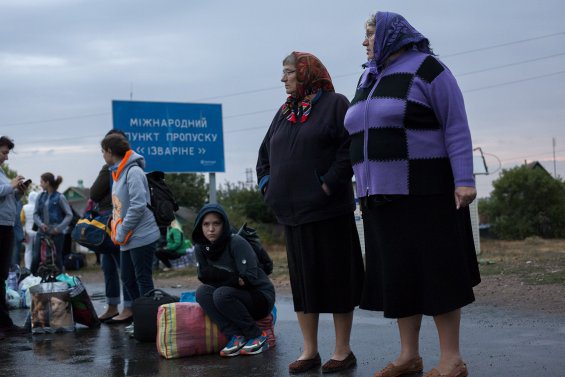
Around four o'clock in the morning a family loses its temper and goes off to the border checkpoint on a taxi (600 rubles [~&15]). Other refugees stop snoring, worry that they won't fit in the bus that allegedly goes three times a day and stops not at the checkpoint but 10 kilometers away from the border. They whisper that there's already a queue at the checkpoint. Tamara and Lida give in to the hysterics and decide to take a car.
The border
The queue does start 1.5 kilometers from the white-and-blue checkpoint buildings - but the queue consists of cars. They aren't being let in yet, but even if they were, no one would be fool enough to go: The self-proclaimed Luhansk People's Republic has imposed a curfew until 7 AM Moscow time. There are almost now "Pedestrians". The Russian border guard does not even open the passports, only checks if they are present. In 100 meters is a Ukrainian border booth. The girl closely examines the papers, comparing the faces in the passport and in her window. You can go by either internal or foreign passport.
In another 300 meters of a wide lit road is the separatists' "customs". Under the roof of a large building it's written: "LNR". The windows are broken, the walls bear bullet markings. A self-proclaimed border guard thumbs through the passports sleepily. We ask a trio of patrolmen with assault rifles what's happening in Novoannovka and on the road to Luhansk. They say it's calm for now.
A last barrier and here's the sign "Izvarine" in Ukrainian. Behind us more and more people from the railway station cross the border. A miserable old woman, losing her way, limps along in the crowd with her bag, almost trips on the holes in the road, puts the bags down right into the puddles lit by the cold light of the full moon and keeps asking everyone at once: "When is the bus for Sukhodolsk coming?" The dozens of refugees seem to not hear her. Rain starts. Tamara and Lida tie headscarves on their heads and stand defiantly.
"Let's go into this store to get warm, the door is open," we suggest sheepishly.
"Why do we care about the door," Lida replies, "We won't get to Novoannovka on it".
Photos by Anna Artemyeva
To be continued
[hr]Source: Novaya Gazeta, translated by Kirill Mikhailov

